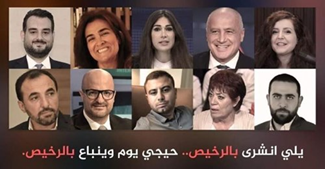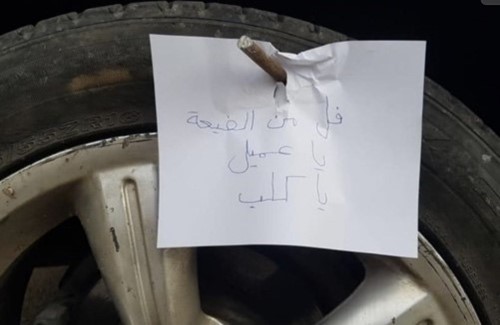Freedom of Speech and the Risk of Criticizing Hezbollah's Actions in Lebanon
Last week, the arrest and interrogation of Makram Rabah, a history lecturer at the American University of Beirut and an outspoken critic of Hezbollah, put the focus on one of Hezbollah's primary tools of handling opposition voices to its policies: silencing them.
Rabah was accused of coordinating with Israel after he referred in an interview to Hezbollah's military infrastructures already published by other media outlets and criticized Hezbollah's unilateral and undisturbed terror activities on Lebanon's soil. He was called for questioning by the General Security Directorate, one of Lebanon's security apparatuses known for its close connections to Hezbollah. The decree itself was signed by Judge Fadi Akiki, the son-in-law of Parliament Speaker Nabih Berri, Hezbollah's closest political ally. That fact amplified the already strong suspicions that Rabah's questioning was politically motivated and meant to intimidate him from further criticizing Hezbollah.
Lebanese Forces and Kataeb, the two main parties that oppose Hezbollah's policies in the country, condemned the General Security Directorate’s acts and supported Rabah's rights of free speech and opinion.
This is not the first time Hezbollah's supporters accused Rabah of treason due to his views. In 2021, Rabah was one of the targets of a Hezbollah-affiliated social media campaign that attacked leading journalists and public opinion figures, who pointed at Hezbollah as responsible for the assassination of their colleague, Lokman Slim.

Lokman Slim, a Shia Muslim himself, was a harsh critic of the organization and received many threats before he was killed. Even though not adequately investigated, the targeted attack was widely attributed to Hezbollah, as Slim received many threats over the years, and intimidating and assassinating journalists is a well-known Hezbollah practice in Lebanon.
In 2005, Hezbollah assassinated Samir Qassir and Gebran Tueni, two leading journalists working for Al-Nahar Newspaper, who voiced harsh criticism against the organization and carried out a failed attempt to kill May Chidiac, another journalist who barely survived the attack which targeted her. Chidiac later became a minister in the government and pointed at Hezbollah as the preparator of the attack against her and her colleagues.
Hezbollah's efforts to silence criticism do not always end up in assassinations. Intimidation campaigns are another tool the organization uses to deliver its terrorizing messages. Over the years, media campaigns, as mentioned above, harassment through the threat of legal actions, or threats of violence were used.

In some cases, the targets of Hezbollah even chose to leave Lebanon due to the fear for their life. The most prominent examples of journalists who took this path in recent years are Hanin Ghaddar, who left Lebanon for the US, and Nadim Koteich, who found sanctuary in the Persian Gulf states. Both Ghaddar and Koteich continue to voice their harsh opposition to Hezbollah's acts and policies from the safety of their new places of residence.
The net result of Hezbollah's continuous efforts to silence public criticism is evident in Lebanon's poor score in the yearly Freedom of Press Index published by "Reporters Without Borders." In 2023, Lebanon gained the unflattering 119th place out of 180 countries rated by the organization. A year earlier, Lebanon scored even worse: 130 out of 180.
Even though this troubling reality has been well-known in Lebanon for years, the recent Makram Rabah incident was particularly important and caused unusual controversy in the domestic arena. The political dynamic in Lebanon is such that politicians, journalists, and social activists expect Hezbollah to use violence or threats of violence against them, and most of them recognize the risks they are taking when taking a stand against the organization. The reason for the current backlash was the active role the official state institutions took in the intimidation effort in the service of Hezbollah—for example the interrogation of Rabah.
The traditional approach by the Lebanese state institutions towards Hezbollah's acts of harassment, intimidation, and targeted violence is looking the other way or undertaking a superficial investigation of those crimes. The fact that never in the history of Lebanon, a Hezbollah member was ever charged, let alone arrested, for the multiple assassinations, attempted attacks, and defamation acts attributed to the organization is proof of that.
Whatever the reason, whether an attempt to maintain political neutrality, fear of Hezbollah retaliation, or ideological/political influence, the formal state institutions refrained in the past from taking a stand in the ongoing political bickering between Hezbollah and its opponents.
But today, the question left unanswered is whether the questioning of Rabah by the General Security Directorate is a one-time unusual event or the beginning of a new era in which Hezbollah's interests in silencing opposition voices against it will be actively promoted through the organization's influence on the formal state security apparatuses. If it is the latter, Lebanon just took another troubling step into becoming a terror state.
Dror Doron is a senior advisor at United Against Nuclear Iran (UANI) focusing on Hezbollah and Lebanon. He spent nearly two decades as a senior analyst in the Office of Israel’s Prime Minister. Dror is on Twitter @DrorDoron
Receive Iran News in Your Inbox.
Eye on Iran is a news summary from United Against Nuclear Iran (UANI), a section 501(c)(3) organization. Eye on Iran is available to subscribers on a daily basis or weekly basis.